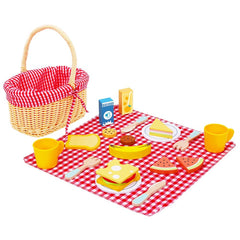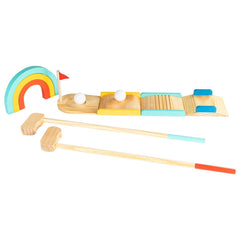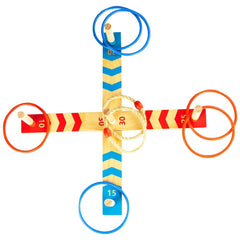Barnshenn believes that play should be more than just having fun; it’s important for how children develop, learn and try to make sense of the world. Pretend play, also known as imaginative play or role play, is one of the most important forms of play.
Whether it’s hosting a tea party with their cuddle buddies or running a grocery store, pretend play is a great way for kids to master life skills in natural and, most importantly, fun ways. Let’s see how it helps in their development.
What is pretend play?
Pretend play is the act of children using their imagination to create stories and take on different roles or act out real-life situations. They could act like a parent preparing dinner; a doctor helping a patient; or a superhero saving the day.
For pretend play, children don't always require expensive toys; a simple cardboard box can often transform into a powerful rocket! But carefully designed toys can inspire focused play. Toys such as the Barnshenn Wooden Play Kitchen allow kids to imagine being chefs and also help them learn basic life skills.
Benefits of Pretend Play
Pretend play is not only a fun activity, but it also plays a crucial role in a child's development. Here’s how:
-
Enhances creativity and imagination: Creating their own stories and scenarios teaches children creative thinking. Pretend play allows them to explore and brainstorm ideas, which helps improve their thinking ability.
-
Enhances communication and language ability: dressing up and playing different characters encourages children to use and try out new words, phrases, and ways of saying things. Whether they are playing “teacher” and explaining something to their toys, or pretending to be a shopkeeper talking to a customer, they automatically expand their vocabulary.
-
Social and emotional development: pretend play teaches important lessons about cooperation, empathy, and turn-taking, for example. When a child pretends to be a doctor and another pretends to be a patient, they learn to view situations from different perspectives. The practice enhances emotional intelligence and promotes confidence.
-
Helps with Fine & Gross Motor Skills: From dressing dolls to pushing buttons on a toy cash register, pretend play allows children to practise fine motor skills. The Barnshenn kids Tool Set, for example, allows kids to practice gripping, twisting, and assembling, which builds motor skills.
The importance of pretend play
Pretend play helps children get ready for real-world scenarios. The activity helps them to explore various characters, learn to manage feelings and develop faith in their own capabilities.
For example, if a child is nervous about going to the doctor, playing with a doctor’s play set at home may help them feel comfortable.
Parents can encourage pretend play by giving children toys that spark their imagination and playing along with them. Simple questions like “What’s for lunch today?” can make the experience even more fun, especially when using a play kitchen set.
Developmental Milestones
Pretend play also looks different across ages, with abilities emerging at different ages. Here’s a guide to the stages of pretend play at various ages:
-
Ages 1-2: Children start off with simple imitation at this stage. They might pretend to talk on a toy phone, feed a doll, or mimic the actions of adults around them. Typically, their pretend play is very basic, but it sets the stage for more advanced pretend play in the future.
-
Ages 2-3: Kids start to reenact daily rhythms, like pretending to cook, clean or care for a baby doll. They enjoy using props like toy pots and pans or toy doctor sets.
-
Ages 3-4: Pretend play gets a lot more elaborate at this age Children learn to write their own stories and cast themselves and others in them. They may pretend to be a firefighter, a shopkeeper, or a superhero. They also love toys that inspire storytelling, such as Doll House or Wooden Play Kitchen.
-
Ages 4-5+: Older preschoolers and early school-age children engage in increasingly sophisticated pretend play. They can track story lines, work out problems in their play, and engage with others in a more collaborative manner.
For example, when playing restaurant, they will take turns deciding who is the chef, who is the customer, and what food is being served on the menu.
Knowing and accepting these developmental stages, parents can select the right toys to facilitate meaningful play experiences.
Final Thoughts
Barnshenn encourages your children to learn through play. Barnshenn wooden toys from sustainable forests are lovingly created to encourage children to learn essential life skills in a fun way through role-playing, imaginative play, and play sets.
So, whether your little one is role-playing a chef, a doctor, or a shopkeeper, they’re building confidence, creativity, and communication skills that will serve them well in the future.
Discover Barnshenn toys and let the adventure begin!
FAQs
1. Why do we promote the pretend play at Barnshenn?
Barnshenn believes that pretend play is a fundamental part of a child's development. It cultivates creativity, linguistic skills, problem-solving and social confidence.
2.What age is pretend play most beneficial for?
Pretend play begins as early as 12–18 months with simple imitation and becomes more elaborate between ages 3 and 5. Barnshenn toys, such as the Wooden Play Kitchen and Doctor's Play Set, cater to different developmental stages.
3. What pretend play toys do we recommend?
Whether you're looking for the perfect dollhouse playset, toy cash register, wooden tool set, or something that allows kids to use their imagination, Barnshenn has a selection of toys that will ignite their interest and get their creative style going. The toy also helps children practice real-life scenarios while building vital skills.
4. Does pretend play help in learning?
Absolutely! Pretend play allows children to practice language and social skills, as well as early math concepts.





